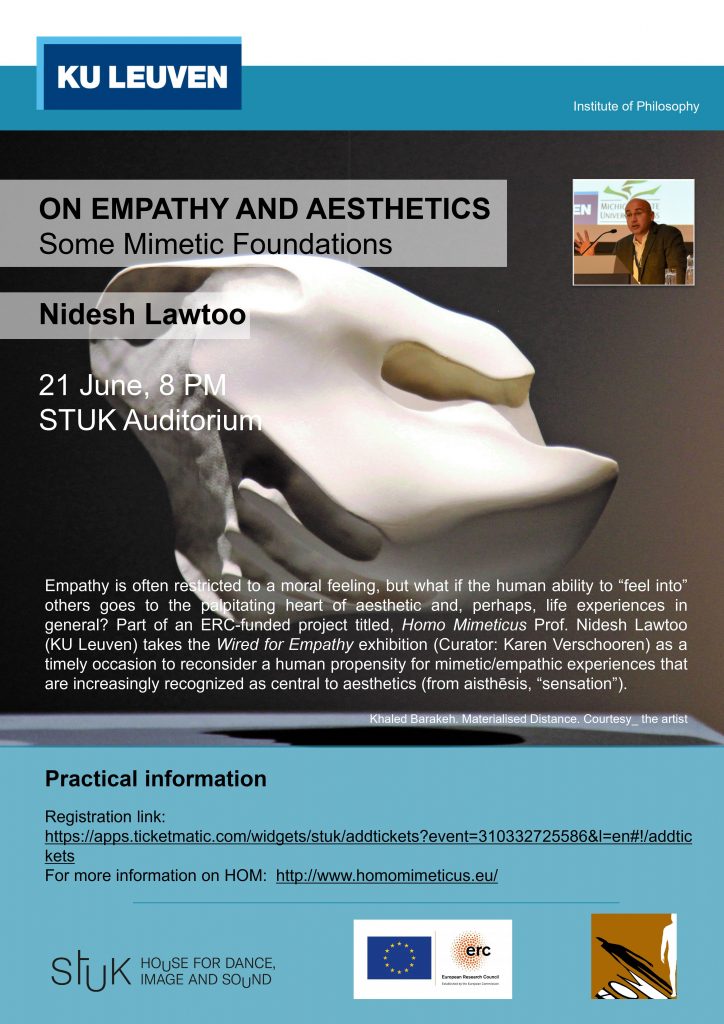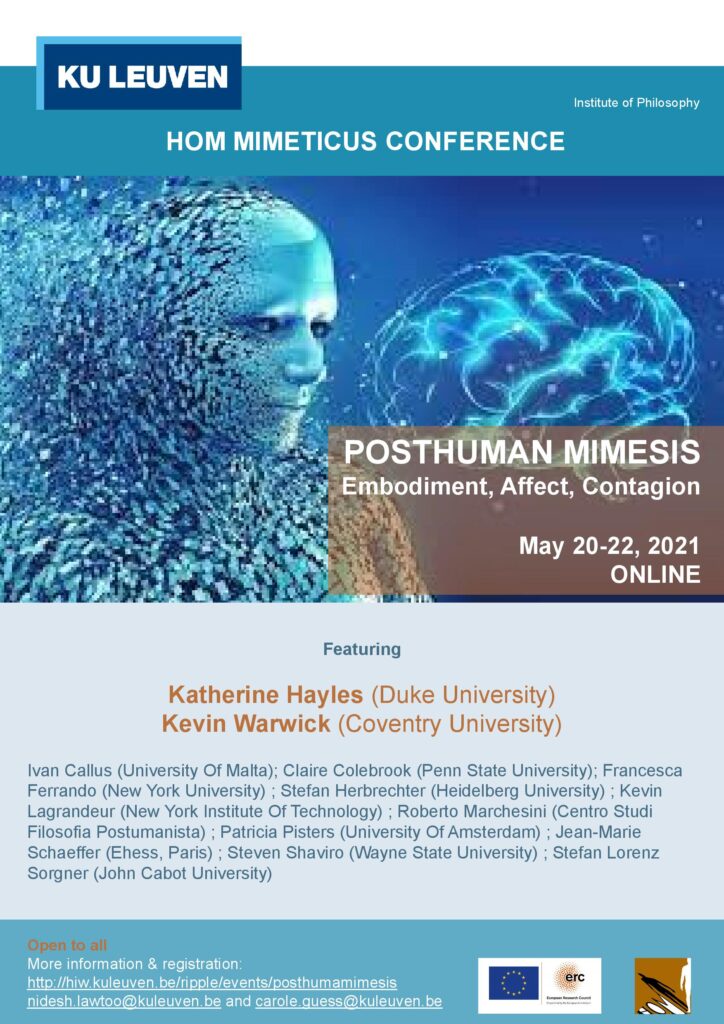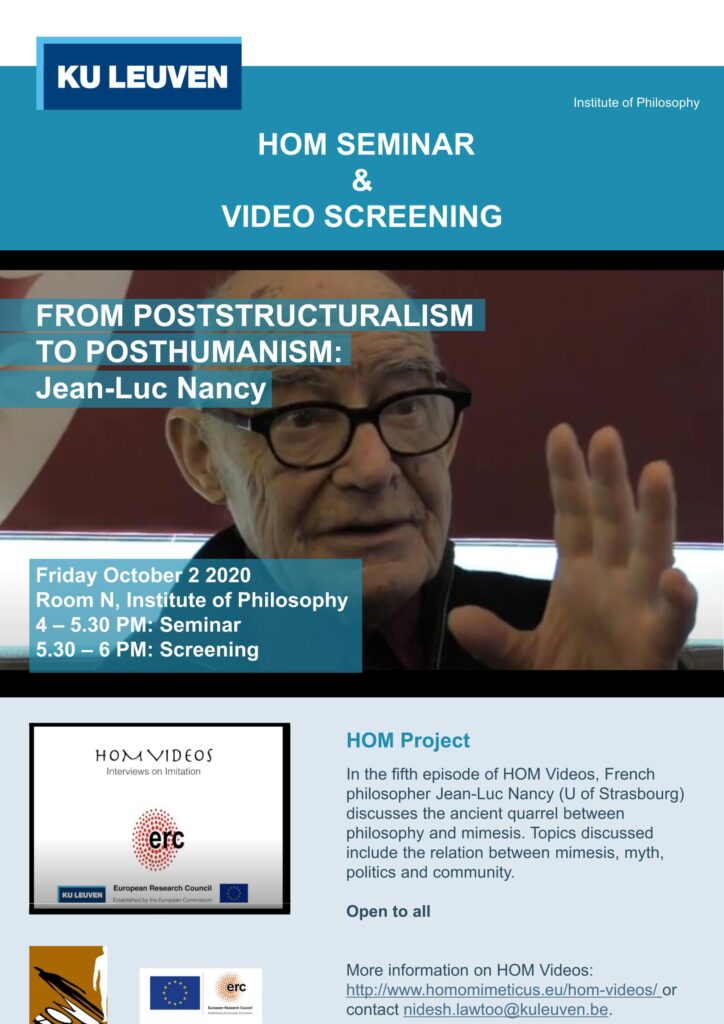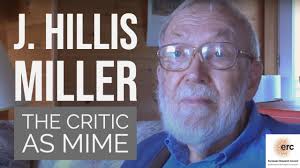In this public lecture for the LMU Doctoral Program on Mimesis Final Conference, Nidesh Lawtoo (KU Leuven) articulates the relevance of HOM Theory to account for the mimetic patho(-)logies in the Age of Covid-19: from affective contagion to viral contagion, conspiracy theories to therapeutic imitations, Lawtoo argues that rethinking mimesis beyond representation is central to account for the patho(-)logies of contagion in periods of pandemic crisis.
Tag Archives: mimesis
On Empathy & Mimesis (Stuk, Leuven 21 June)
Empathy is often restricted to a moral feeling, but what if the human ability to “feel into” others goes to the palpitating heart of aesthetic and, perhaps, life experiences in general? Prof. Nidesh Lawtoo (KU Leuven) takes the Wired for Empathy exhibition (Curator: Karen Verschooren; STUK/Artefact June 2021) as a timely occasion to reconsider a human propensity for mimetic/empathic experiences that are increasingly recognized as central to aesthetics (from aisthēsis, “sensation”).

The Critic and the Mime: J.Hillis Miller in Dialogue with Nidesh Lawtoo
In this interview for the Minnesota Review, J. Hillis Miller and Nidesh Lawtoo take one of the most influential concepts in Western aesthetics, mimēsis, as an Ariadne’s thread to retrace the major turns in Miller’s career and, by extension, to promote a re-turn of mimesis in literary theory and criticism. More here .
Posthuman Mimesis: Embodiment, Affect, Contagion (May 20-22)

The ERC Project Homo Mimeticus: Theory and Criticism is pleased to announce an international online conference on the subject of “Posthuman Mimesis.” More details including program and registration here.
The Mimetic Turn: Reloading Mimesis (Nidesh Lawtoo)
In this opening session of the Homo Mimeticus Seminar (KU Leuven), PI Nidesh Lawtoo introduces some of the main concepts constitutive of the mimetic turn, or re-turn of mimesis in critical theory, including mimetic pathos, pathos of distance, mimetic patho(-)logies, and their relevance for the COVID-19 pandemic crisis.
Toward the Mimetic Posthuman (Carole Guesse)
As part of the Homo Mimeticus Seminar (KU Leuven), Postdoctoral researcher Carole Guesse (@CrlGss) provides a short introduction to the posthuman and its discourses: transhumanism and posthumanism. She then explores the various ways in which the posthuman – in both theory and (science) fiction – can be characterized as mimetic.
Premiere: Jean-Luc Nancy on Philosophy & Mimesis Video
Tune in on Thursday, October 8, at 8pm for the premiere of the latest episode of HOM Videos, Jean-Luc Nancy: Philosophy and Mimesis. Topics discussed include the relation between philosophy and literature, myth, politics and community. Sign up via this link:
HOM Seminar Reloaded: from Poststructuralism to Posthumanism
Join us for the first session of the HOM Seminar on Friday, October 2, 4pm, Room N, Institute of Philosophy, KU Leuven. Presentations by Nidesh Lawtoo on the “mimetic turn”, new HOM-team member Carole Guesse on “posthuman mimesis,” and discussion of an interview with J. Hillis Miller, supplemented by a screening of Jean-Luc Nancy. More details here: https://hiw.kuleuven.be/hua/events/hom-seminar
Please register by sending an email to: niki.hadikoesoemo@kuleuven.be

Reading Conrad in Catastrophic Times: The Mimetic Turn
In this video presentation for the 2020 Joseph Conrad Society (UK) Annual Meeting shot on the Furka Pass (Swiss Alps), ERC grantee Nidesh Lawtoo introduces the relevance of Conrad’s mimetic turn to face contemporary catastrophes like (new) fascist politics, viral pandemics, and climate change in the Anthropocene. https://www.jstor.org/stable/10.14321…
The Case of Eichmann Restaged: Arendt, Evil, and the Complexity of Mimesis

In The Case of Eichmann Restaged, Nidesh Lawtoo reframes Hannah Arendt’s evaluation of the “banality of evil” in light of Eichmann’s mimetic psychology, which Arendt intuited but did not fully articulate.
Rather than considering the banality of evil as symptomatic of Eichmann’s “inability to think,” the essay foregrounds the affective, contagious, and, in this sense, mimetic tendencies at play in Eichmann’s personality (from Latin, persona, theatrical mask). This move is instrumental to articulate a middle path between Arendt’s theoretical diagnostic of Eichmann as “terrifyingly normal” and Bettina Stangneth’s recent historical account of Eichmann as a “fanatical National Socialist.” My wager is that the ancient problematic of mimēsis (from Greek, mimos, mime) casts a new and original light on the psychic foundations of a type of evil that is as relevant to understand the psychology of fascism in the past century as its rising shadow in the present century. Article also available here

